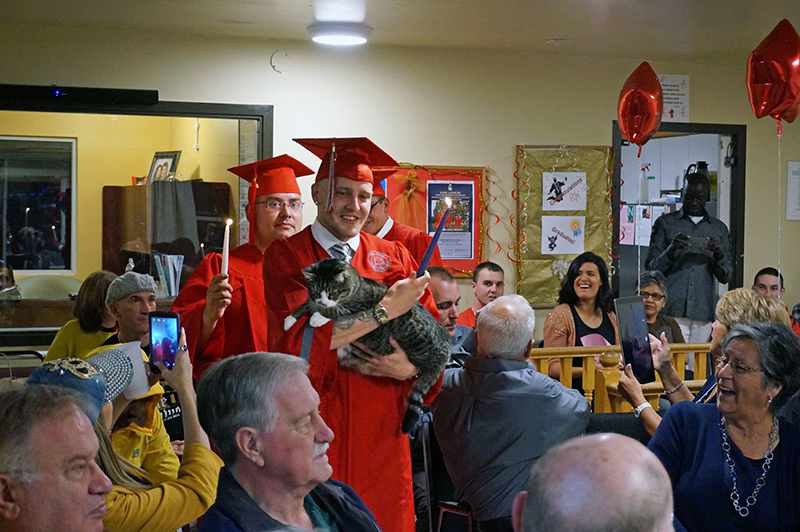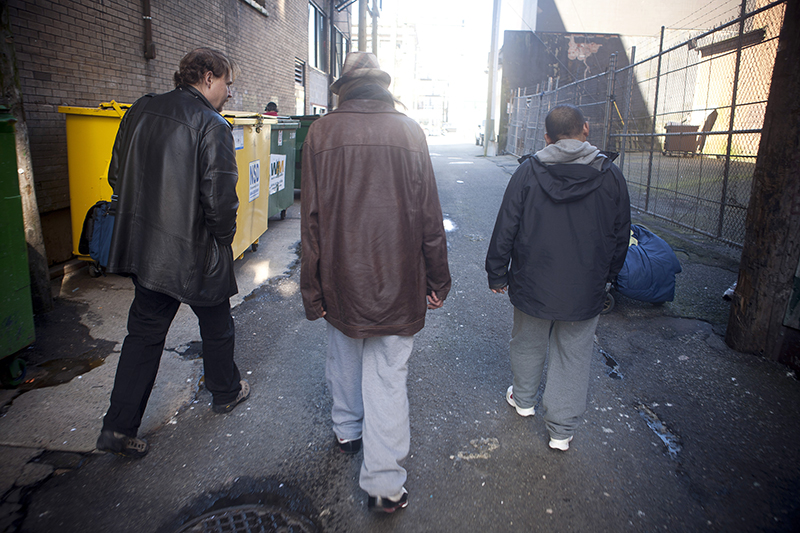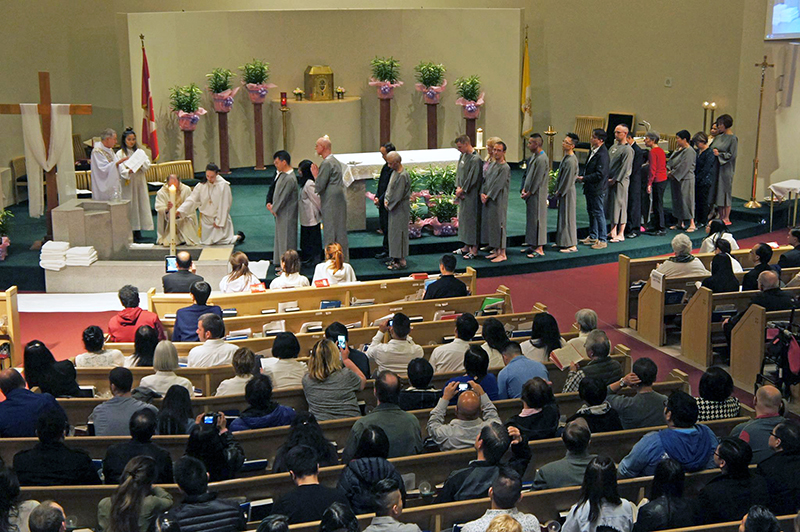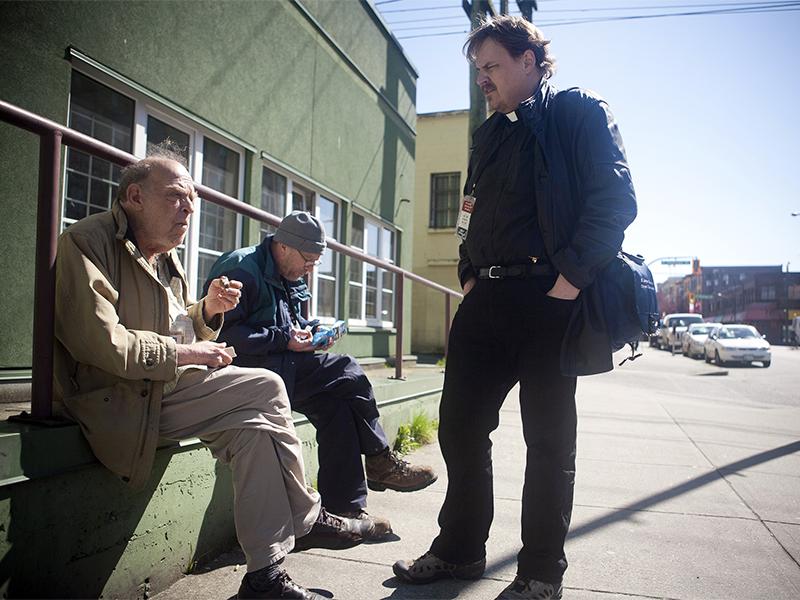VANCOUVER, British Columbia (RNS) Freddy’s addiction started with alcohol, moving up to methamphetamines and heroin. He was in and out of juvenile detention as a teenager and ended up in jail as adult.
After trying four other rehab programs, he came to Luke 15 House, a faith-based recovery center.
“I always felt like there was something missing,” says the 33-year-old recovering addict.
Freddy, who asked that his full name not be published, smoothed his short, dark hair and smiled.

The Rev. Pierre Leblond baptizes Luke 15 House resident Ed on April 15, 2017, at St. Mary’s Catholic Church in Vancouver, British Columbia. Photo courtesy of Luke 15 House/Uriel Pena
“Other programs don’t talk about God or faith,” he says. And at the other centers, he was sometimes able to pay off house managers to let him stay out all night or get high.
“Facilitators didn’t really care. I don’t think anyone got clean.”
On a recent day, Freddy was one of 20 men singing Christian praise and worship songs in the dining room of Luke 15 House, named after a chapter of the New Testament that contains parables of loss and redemption.
“When I first came here I was nervous and I questioned everything,” says Sean Wild, 34, a resident who says he’s been off drugs for a year. “But there is such a sense of peace from the moment you walk in the door and people are so welcoming, you feel like ‘Wow, I’m loved here. I changed totally.’”
In 2016 more than 900 people in British Columbia died of drug overdoses, a record and an 80 percent increase from 2015. The culprit: fentanyl, an opioid painkiller 100 times more powerful than morphine. The smallest error in dosage can be fatal.
[ad number=“1”]
Overprescription of opioid painkillers created demand for the powerful drugs. In the early 2000s Canadians were being prescribed opioids such as oxycodone even for chronic pain. Illicit manufacturers soon began producing fentanyl pills using cheap, easily imported chemicals from China. First responders started seeing staggering numbers of overdoses.
Under British Columbia’s health care system, addicts are eligible to receive $30 Canadian ($21 U.S.) per day for treatment, which they pay to Luke 15. The rest of the center’s funding comes from fundraising initiatives, private donors and various local churches.

Graduates enter a ceremony at the Luke 15 House recovery program in Vancouver, British Columbia, in September 2016. David enters the festivities carrying the Luke 15 House therapy cat, Tyke, whom David credits with helping in his recovery. Graduates who have completed the recovery program are ready to transition back into the community. Photo courtesy of Luke 15 House/Kathy Shantz
The center, on a quiet residential street, has space for 24 men, who often arrive straight out of jail and are encouraged to stay for at least 10 months. They go on a 12-step program that combines an Alcoholics Anonymous-type plan with scripture study and are assigned a structured daily routine that includes daily prayer and dinners with former residents to see that a drug-free life is possible.
“We don’t tolerate fighting, and there is no swearing in the house,” says Jeremy Ruud, the program director at Luke 15 and a recovering heroin addict himself.
While publicly funded agencies focus on harm reduction measures – such as distributing naloxone kits to counteract overdoses – the 19 Christian-run recovery homes and other Christian outreach services in the area seek to address the spiritual emptiness that pastoral workers here believe is one of the key factors in drug addiction.
“Having an encounter with Jesus breaks every chain in our lives,” Ruud says.
[ad number=“2”]
Still, that claim is hard to substantiate. Recovery centers are not regulated and neither the faith-based homes nor the British Columbia Health Ministry defines standards for success.
“Because addiction is a lifelong process there is no conclusive way” to keep statistics on recovery rates, says Nigel Vincent, the executive director of Luke 15 House.
And to him, success also means being able to give “many people who have been in darkness (the chance) to encounter Christ … and (the chance) to work on healing they’ve never done before.”

The Rev. Matthew Johnson, left, ministers to men in an alley in downtown Vancouver, British Columbia. Photo courtesy of Chris Loh
The Rev. Matthew Johnson runs the Street Outreach Initiative at St. James’ Anglican Church on Vancouver’s downtown east side. The goal of the program is to bring the church to the area’s homeless and addicted residents. Johnson spends his days walking the neighborhood, talking and praying with residents.
“A lot of people whose lives are characterized by chaos find great power in structured liturgy,” he says. “It makes an enormous difference when you address issues of the human spirit. It strengthens the part of the person that is capable of resilience.”
[ad number=“3”]
When a parishioner decides to change his or her life, Johnson helps the person figure out which options are best and how to access those services. This brings him face-to-face with the holes in the government-run health system.
“When people decide to quit they have to wait a long time for detox. After detox most do not end up in a program to help them shape a drug-free life,” Johnson explains.
A report by the Canadian Broadcasting Corp. published in 2016 revealed the challenges of finding a bed in a recovery program in British Columbia. Aside from the lack of a centralized database to track available beds, there is no regulation of recovery programs, so cost and effectiveness can vary widely from program to program.

The baptismal water is blessed at St. Mary’s Catholic Church in Vancouver, British Columbia, on April 15, 2017. Six Luke 15 House residents and alumni are among those waiting to be baptized at the Easter vigil Mass. Photo courtesy of Luke 15 House
“If somebody wants to quit, they can’t,” says Scott Small, who manages a staff of 15 at the Catholic Charities of Vancouver Men’s Hostel. Those who do get clean often cannot find affordable housing and continue to rely on shelters, where they live side by side with addicts who are still using. “Try staying clean in that situation,” Small says. The lack of affordable housing has been a growing concern for several years in the metro Vancouver area.
Small’s hostel serves 102 men. The relatively small size of the hostel means staff can spend time working to find longer-term solutions for each guest.
Similarly, at Luke 15 House, caps on the number of participants allow the staff to focus on each resident individually.
Freddy thinks back on his previous life. “I was totally different. I was a jerk, always in a bad mood and I was really skinny,” he recalls. Now his housemates and staff describe him as “a teddy bear.”
(Alicia Ambrosio is a writer based in Vancouver)





